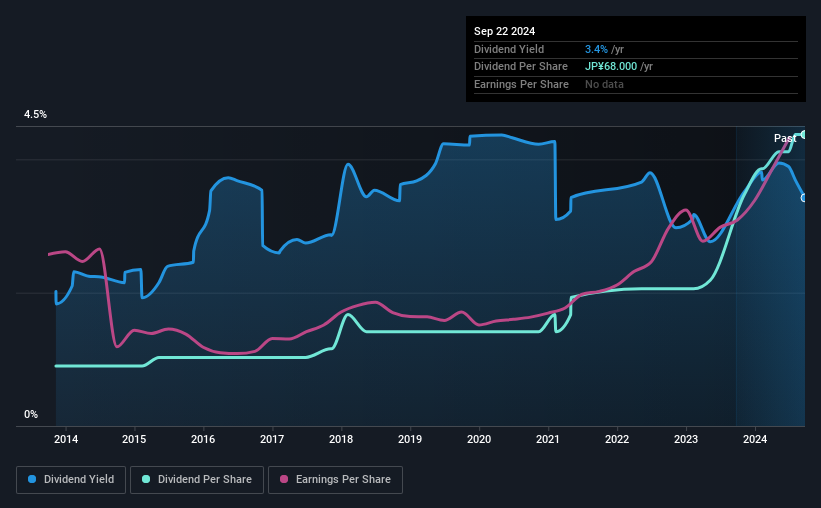CashNews.co
Readers hoping to buy Japan Securities Finance Co., Ltd. (TSE:8511) for its dividend will need to make their move shortly, as the stock is about to trade ex-dividend. The ex-dividend date is one business day before a company’s record date, which is the date on which the company determines which shareholders are entitled to receive a dividend. The ex-dividend date is important as the process of settlement involves two full business days. So if you miss that date, you would not show up on the company’s books on the record date. Therefore, if you purchase Japan Securities Finance’s shares on or after the 27th of September, you won’t be eligible to receive the dividend, when it is paid on the 9th of December.
The company’s next dividend payment will be JP¥42.00 per share. Last year, in total, the company distributed JP¥64.00 to shareholders. Based on the last year’s worth of payments, Japan Securities Finance stock has a trailing yield of around 3.4% on the current share price of JP¥1987.00. We love seeing companies pay a dividend, but it’s also important to be sure that laying the golden eggs isn’t going to kill our golden goose! That’s why we should always check whether the dividend payments appear sustainable, and if the company is growing.
View our latest analysis for Japan Securities Finance
Dividends are typically paid out of company income, so if a company pays out more than it earned, its dividend is usually at a higher risk of being cut. Japan Securities Finance paid out a comfortable 44% of its profit last year.
Companies that pay out less in dividends than they earn in profits generally have more sustainable dividends. The lower the payout ratio, the more wiggle room the business has before it could be forced to cut the dividend.
Click here to see how much of its profit Japan Securities Finance paid out over the last 12 months.

Have Earnings And Dividends Been Growing?
Companies with consistently growing earnings per share generally make the best dividend stocks, as they usually find it easier to grow dividends per share. If earnings fall far enough, the company could be forced to cut its dividend. That’s why it’s comforting to see Japan Securities Finance’s earnings have been skyrocketing, up 21% per annum for the past five years.
Many investors will assess a company’s dividend performance by evaluating how much the dividend payments have changed over time. Japan Securities Finance has delivered an average of 17% per year annual increase in its dividend, based on the past 10 years of dividend payments. It’s exciting to see that both earnings and dividends per share have grown rapidly over the past few years.
Final Takeaway
Should investors buy Japan Securities Finance for the upcoming dividend? Companies like Japan Securities Finance that are growing rapidly and paying out a low fraction of earnings, are usually reinvesting heavily in their business. This is one of the most attractive investment combinations under this analysis, as it can create substantial value for investors over the long run. We think this is a pretty attractive combination, and would be interested in investigating Japan Securities Finance more closely.
In light of that, while Japan Securities Finance has an appealing dividend, it’s worth knowing the risks involved with this stock. Every company has risks, and we’ve spotted 2 warning signs for Japan Securities Finance (of which 1 makes us a bit uncomfortable!) you should know about.
A common investing mistake is buying the first interesting stock you see. Here you can find a full list of high-yield dividend stocks.
New: Manage All Your Stock Portfolios in One Place
We’ve created the ultimate portfolio companion for stock investors, and it’s free.
• Connect an unlimited number of Portfolios and see your total in one currency
• Be alerted to new Warning Signs or Risks via email or mobile
• Track the Fair Value of your stocks
Try a Demo Portfolio for Free
Have feedback on this article? Concerned about the content? Get in touch with us directly. Alternatively, email editorial-team (at) simplywallst.com.
This article by Simply Wall St is general in nature. We provide commentary based on historical data and analyst forecasts only using an unbiased methodology and our articles are not intended to be financial advice. It does not constitute a recommendation to buy or sell any stock, and does not take account of your objectives, or your financial situation. We aim to bring you long-term focused analysis driven by fundamental data. Note that our analysis may not factor in the latest price-sensitive company announcements or qualitative material. Simply Wall St has no position in any stocks mentioned.
